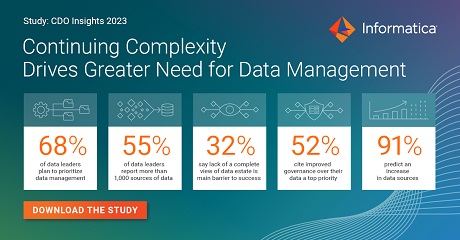4 Strategic Ways You Can Empower Data-Led Business Resiliency
It’s easy to understand why organizations want to become more data driven: data-driven organizations are primed to deliver better business performance. Employees who don’t have to spend as much time looking for and preparing data for use can work more efficiently. Collaboration across the organization can improve time to market for key business priorities. This leads to a better use of resources and reduced operational costs. And data-driven organizations are more likely to be transparent, delivering improved operational risk management.
This explains why data leaders should be bullish about their ability to drive positive impact for business priorities. Smart data leaders can focus on initiatives that produce clear business outcomes, such as customer experience, supply chain optimization, operational efficiency and business agility.
Fostering a data-driven culture and making effective use of data in business decision-making should also be a top priority. With the increasing economic uncertainty facing organizations and their data leaders in 2023, being data-driven becomes even more critical to help navigate risk and build business resilience. And that is why top-performing data leaders know delivering on these priorities means investing not just in data, but how they manage it: more than 2 in 3 data leaders (68%) predict an increase in data management investments in 2023. This was a key finding of our newly published study, “CDO Insights 2023: How to Empower Data-Led Resiliency.” This study, conducted by Wakefield Research on behalf of Informatica, captures the findings of our survey of 600 chief data officers, chief analytics officers, and chief data and analytics officers throughout the United States, Europe and Asia Pacific region.
Our study found many examples of how a maturing data leadership wants not just data management capabilities but also a well-planned strategy that is linked to clear business outcomes. It’s no longer enough to make investments in data and data capabilities. To empower business resiliency and agility, you need:
- The right strategy
- Organizational alignment on strategy
- Strategy linked to clear business outcomes
- Prioritizing the right kind of data management investments to support the strategy
Here are four ways that data-led organizations can empower business resiliency.
Aligning Data Strategy to Empower Business Priorities
When data strategies and business strategies are aligned, their organizations are more likely to prioritize data management investments. Data leaders feel more empowered and more confident about their ability to effectively execute their data strategy. And they have greater control over their budget.
- 92% of those very or completely aligned feel empowered to execute on their current data strategy.
- 76% of those who reported being very or completely aligned on their data and business strategy also had complete control of their budget.
- 83% of the data leaders who fully control their data budget are more effective in achieving their data strategy goals.
Investing for Data Democratization, Trust and Governance
One new and emerging business imperative: the need to establish or foster a data-driven culture. Data leaders who want to ensure alignment know that they need to prioritize the right kind of investments in data management. The best investments have long-term benefits that promote trust, understanding and responsible use of data. For 2023, leaders identified these priorities:
- 52% plan to improve governance over data and data processes
- 46% want to improve data-driven culture and data literacy
- 44% plan to improve data privacy and security
- 42% want to enable effective data sharing, democratization and use
Taking a Unified Approach to Manage Data Fragmentation and Complexity
More than half (55%) of the data leaders we surveyed reported that their organization has more than 1,000 sources of data. This often creates a major obstacle: 32% of the data leaders surveyed said that the lack of a complete view and understanding of the data estate is the reason they cannot execute on their data strategy.
And data leaders expect that the volume and variety of data sources will only get more complex in 2023. A large majority of data leaders (91%) predict increases in data sources of all types:
- 78% data sources for analytics
- 77% cloud data stores
- 77% applications
Since an organization that cannot manage its data volume cannot harness any of the benefits of their data, proactive data leaders know they cannot solve this with one-off, siloed tools — they need to address this challenge with a unified data management approach that provides them with the flexibility to grow and evolve based on business needs.
Measuring What Matters
The data strategy has to enable business outcomes. And our study showed this: Top-performing data leaders want the ability to measure how data strategy impacts business results. Gaining the ability to improve how data is used in business decision making and operational processes was cited by 45% of data leaders. And data leaders who saw real gains from their strategies and investments were most closely associated with this metric. Ultimately, this shows that this is about more than data for data’s sake: it’s about generating real value.
Improving the quality of data was key for many data leaders:
- 44% want to improve the quality of analytics used for decision making
- 44% plan to improve data quality
- 47% want to improve the efficiency of their data management and analytics activities
- 40% want to improve the timeliness of data delivery
Empower Data-Led Resiliency
As the pace of business change continues to accelerate, organizations realize that the risk of being left behind is a price that they’re not willing to pay. And gaining timely, business-critical insights from their data and analytics is what data leaders need to do in order to empower data-led business resiliency. Modern data-driven organizations need an approach that will allow them to:
- Align data strategy to business strategy
- Align organization structures to data strategy
- Align data management investments to business use cases
- Align tool selection to enterprise standards
Learn More
Join us at our 2023 CDO Data Strategy Forum for timely insights, predictions and trends. You’ll hear from global data leaders and industry experts about what being “data-driven” means for today’s data leaders and how you can empower data-led business resiliency for your organization.
Download your copy of “CDO Insights 2023: How to Empower Data-Led Business Resiliency.”









